As the next congressional election approaches, the United States has seen more diversity in endorsed candidates than it has in its history.
While diversity is regularly brought into question when an election approaches, how much difference does it really make? Within the communities the candidate may belong to and to the rest of that voting district, it can mean a lot.
The two candidates that have drawn media attention this time are Christine Hallquist, a transgender woman nominated for governor of Vermont, and Ilhan Omar, a Muslim Somali refugee nominated for a Minnesota Congress seat.
To find out why these are notable actions, several North Dakota State students offered their opinions on the candidates.
Zach Tarble, a junior studying biological sciences, and Krista Paulus, a junior pursuing criminal justice, spoke on the importance of Hallquist’s nomination. Tarble is president of NDSU’s Pride Alliance, and Paulus is the vice president of the organization.
While speaking on Hallquist’s nomination, Tarble said it emphasizes the importance of visibility and how that visibility positively impacts the LGBT+ community. He also talked about how having a member of that community is better than having another ally in a political leadership role because they can better relate to the community’s voice.
Paulus expressed that she believed it to be important to see that step taken. To Paulus, it signified a step toward acceptance. She continued by saying the acceptance she believes is present may not happen overnight; there is still a lot of work to be done to gain acceptance. However, this is a step in the right direction.
Perfection is far away, but Tarble voiced that he hopes to see a day when Hallquist is recognized as just a politician, not as a transgender woman politician, and that the label of being a transgender woman will some day not affect her chances of success in the minds of people who do not support that community. Paulus commented saying that as more transgender people become involved in politics, the label will mean less as it will become normalized.
Paulus’ concerns are more based around seeing negative push back from the community. Tarble agreed and said that he fears that Hallquist may simply be dismissed in the event she holds office one day.
In terms of policy, the two believe she will swing liberally on social issues and that, if elected, she will dive deep on traditionally taboo or “vanilla” government. Tarble expressed that he hopes seeing a transgender woman in government will produce more internationality that pulls all groups, regardless of gender identity, religion, race or anything else, together.
In regard to Omar’s nomination, Hajira Hassan, an undeclared freshman, and Zahra Gaal, a freshman pursuing political science, both Muslim women like Omar, spoke on why this nomination is important to them.
Gaal expressed that being a woman from a Muslim and Somali community Omar can better relate to the difficulties that that community may face because she has experienced it. Hassan noted that having a Muslim woman in a high ranking position like a congressional seat communicates a message to young girls that they can dream big and help their community.
The two students did have some reservations about how Omar would be perceived by some members of the public. Hassan said she anticipated people wrongly associating Omar’s headscarf with terrorism and ignore her intelligence.
Gaal had concerns about Omar facing immediate alienation from other congressional members, or that she would be perceived as an enemy right away.
Hassan and Gaal both agreed that Omar being a Muslim, refugee woman of color puts her at a lot of disadvantages in a political climate full of white men because “society decided” that white men get more respect than a woman, Muslim or person of color. Gaal continued to say that Omar will be battling stereotypes for her entire political career.
However, Gaal also said that if Omar is elected into office, it would bring a chance for more people like Omar to come into politics and take on leadership roles.
Hassan said having Omar in office would bring change in the communities because she can relate to them more easily due to her culture or religion. She can also send a message to those communities saying that they can excel like she did, either overtly or passively.
Gaal continued to talk about the isolation that the Somali community sometimes experiences due to its high level of immigrant populations and feeling alienated in a society that they may not understand or that may not accept them fully. She believes that if Omar is elected she can begin building bridges between communities to facilitate better understanding.
Gaal doesn’t know how easy that task will be, saying that Omar may be ignored or seen as a threat, but in a perfect world she would be able to rid some of the isolation the Somali community feels.
Hassan said that it’s time for the new generations to step out of the box and begin building these bridges themselves, while Gaal stated that the older generations often isolate themselves from doing so.
Part of building this bridge is Hassan asking the NDSU community to create a Somali association, or to put on a Somali culture night. Gaal encouraged the NDSU community to reach out and take that step to build bridges with minorities.
